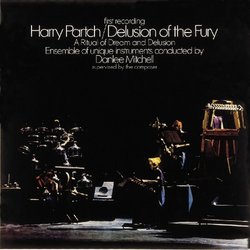| All Artists: Harry Partch Title: ENCLOSURE:DELUSION OF THE FURY Members Wishing: 4 Total Copies: 0 Label: Innova Original Release Date: 11/2/1999 Release Date: 11/2/1999 Genres: Jazz, Classical Styles: Avant Garde & Free Jazz, Chamber Music, Historical Periods, Classical (c.1770-1830), Modern, 20th, & 21st Century Number of Discs: 1 SwapaCD Credits: 1 UPC: 726708640620 |
Search - Harry Partch :: ENCLOSURE:DELUSION OF THE FURY
 | Harry Partch ENCLOSURE:DELUSION OF THE FURY Genres: Jazz, Classical
|
Larger Image |
CD Details |
CD ReviewsPartch's dance to the beat of a different drummer Robert H. Nunnally Jr. | Allen, TX United States | 12/29/2000 (5 out of 5 stars) "Harry Partch's music has the rare distinction of being both enormously influential and yet largely forgotten by the listening public. One can hear Partch's influence in sources as disparate as 60s suspense movie background music, the later music of Tom Waits, and the numerous Partch homages paid throughout the Residents' music. In many ways, Partch anticipated the fascination with sound for sound's sake that many of the early ambiant synthesizer artists discovered with the help of later-evolved electronic insights.Partch's approach was unconventional--dissatisfied with the western musical scale, he developed his own scale in search of a more "natural" set of harmonics. This necessitated the creation of a series of fanciful and frankly odd musical instruments, which have sounds ranging from a somewhat sci-fi-ish thing that sounds like a singing saw to gloriously unconventional percussive instruments to all sorts of off-kilter strings. One might imagine that music inspired by such a curious muse might be entirely inaccessible. Some Partch can indeed require a tolerant ear on first listen. Delusion of the Fury, though, is a driving, incisive and altogether workable piece, percussive and insistent, and thoroughly listenable. The piece has a symphonic feel, but it is not at all stuffy. Partch's fondness for percussion and for eastern musical forms in much in evidence, to the benefit of the listener.Although the work has a mythologic story to tell, the listeneris best transported by the wash of sound. This is one to own, and one to savor." At last it's available again! Christopher Forbes | Brooklyn,, NY | 06/11/2002 (5 out of 5 stars) "The music on this CD captivated me as a teenager in the early 70's. My old copy on Columbia is now scratched up, and my turntable doesn't work anymore so I was overjoyed to see this reissue.Delusion is arguably Partch's masterpiece (though I know some who reserve that title for The Bewitched). It is a true Gesamlichkunstwerk, outdoing Wagner in the integration of art drama and music. As such, a CD of this work is at best only a sketch of the complete work. But even at that, this is powerful and deeply original music. Partch rejected equal tempermant early in his career and was one of the first composers to do so, paving the way for Lou Harrison, La Monte Young and Terry Riley. Partch opted instead for a scale divided into 43 tones using principals of just intonation. And to work with this new sound world he created a new orchestra of instruments, as beautiful to look at as to hear. Delusion consists of two tales with an overture, interlude and extended coda. The first tale is taken from a Japanese Noh drama and examines the nature of death and the release from suffering. The second tale is Ethiopean, and is a humorous view of ordinary life and civic relationships. But the use of music takes both tales from out of their immediate context and makes them more dreamlike and universal. In many ways, Partch's stage concepts predated the work of people like Peter Brooks...looking for the universal mythic experience. Musically, the work is quite percussive and the sound world is strange at first. But even with it's microtonal aspects, this is still a primarily tonal work. And the rhythm is driving and regular. This piece does not resemble the arcane structures of the European avant garde, or Cage's seeming random rhythms. It is vital and full of energy. This is a work to savor." An American original with a universal mind Christopher Forbes | 02/04/2004 (5 out of 5 stars) "I was introduced to Harry Partch and "Delusions of Fury" in a History of Jazz course I took as an undergraduate 32 years ago and spent more than a decade waiting for Sony to put it out on CD after my record wore out. Now I have the pleasure of watching my own college students respond to Partch's brilliant, haunting music. It's not an exaggeration to say there is nothing quite like "Delusions of Fury." Partch built his own instruments or altered existing ones to achieve the sounds heard in the piece, which was influenced by Japanese Noh plays, stories from Africa and his own experiences as a hobo. Like Charles Ives and John Cage before him, Partch confounded traditional minded musicians and critics and he continues to do so. Consequently he has been been the subject of neglect in the history of American music. Hopefully the re-issue of this album will find a new audience of listeners for Partch's unique, powerful and visually conceived music."
|

 Track Listings (14) - Disc #1
Track Listings (14) - Disc #1